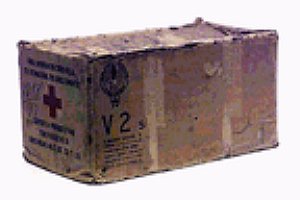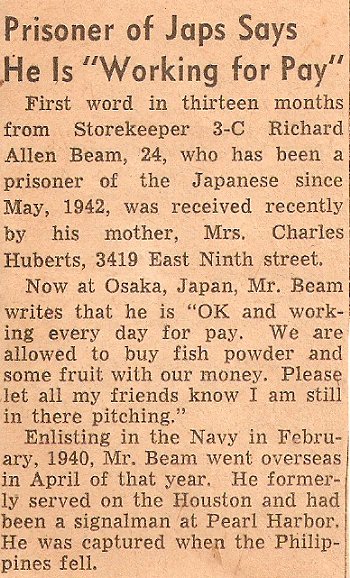|
Chapter 14: POW - Osaka Camp #3 - Osaka, Japan
Osaka POW Camp #3 was established at the site of Yodogawa Steel Company
in Momoshima-cho, Nishiyodogawa-ku, Osaka City in November 1942. It was
originally classified as a Branch Camp (military-run) and then later
reclassified as a Dispatched Camp (civilian-run). All POW's were used by
the Yodogawa Steel Company.
The 400 men total from the Nagato Maru Hell Ship is thought to have
consisted of 45 Army officers, 1 Naval officer, and 354 enlisted men
from all branches of military service. 109 POW's died while imprisoned
at Yodogawa.
Medical examinations in subsequent days found most of the men were
suffering from beri-beri, pellagra, pneumonia, flu, dysentery, scurvy,
and/or diarrhea. But, there was no medicine available for treatment.
Richard A. Beam - USS Biloxi Interview with Tommy English - 20 Sep 1945 - All Rights Reserved
We were given papers swearing that we would not attempt to
escape and then were taken to a large building which they had
sectioned off into rooms. We were told to rest until they had
prepared a meal for us. The meal consisted of rice, quite a
few vegetables mixed with a bean paste to make a soup, and
fish.
I remember that it was pretty cold here, but all of us were
tired and didn't care about the coldness and soon we were
asleep.
We rested for about a month and then started to work in
January (1943) at the steel factory.
I was assigned to the "Unpan Detail" which translated means
carrying detail. We had a wooden pole about 6 feet in length
from which buckets were suspended on each and by means of a
rope. It took 2 men to carry it when the buckets were filled.
Our job was to unload coal and steel barges.
We were treated badly. Everytime we tried to warm our hands
or ourselves by the fires, we were slapped, beaten, and driven
back to work.
The food was of good quality but there was not much of it.
Some men starved to death due to lack of enough food.
We went to work at 7 AM and went to lunch at 1130 AM, then
work call went out at 1240 and at 1 PM we went to work. We
knocked off at 530 PM.
|
At some point during his stay at Osaka Camp #3, Dad and other POW's
were assigned work inside the Yodogawa Steel Company factory.
Richard A. Beam - Indianapolis News Interview - 05 Feb 1981 - All Rights Reserved
"I made some of the damnedest welds you ever saw, the first year
I was there," said Beam, who was a storekeeper in the US Navy.
"They finally found out we were sabotaging them."
Beam explained that he would cut holes in the military hardware
he worked on, then mask it with welds. "Their losses in aviation
fuel were probably pretty high," he said. "I got a lot of
satisfaction out of it."
|
The primary civilian guard was known as the "Beast of Burden" as
well as one that enjoyed punishing POW's for minor infractions of
the rules. Examples:
- In March of 1943, POW Virgil Byrd of the USS Quail sold an extra
pair of shoes to a Japanese worker. Byrd was beaten unconscious 3
times, revived, and kicked/beaten again. He did not survive. The
entire camp was forced to watch.
-
In July of 1943, Dad and five others were on the "sick list" and
were playing poker, using cigarettes as chips. This was against
camp rules. Dad and his fellow POW's were taken outside by the
guards who beat them with their fists. When the POW's were
knocked to the ground they were kicked, after which some of them
were pulled to their feet and knocked down repeatedly.
Richard A. Beam - Indianapolis News Interview - 05 Feb 1981 - All Rights Reserved
Beam called himself the "head scrounger" of his camp and said
he got back at the Japanese whenever he could. He believes his
rebellious attitude, although it resulted in some beatings,
helped him endure.
"I've always believed in survival of the fittest, and I tried
to stay as fit as I could. And to do this, I stole them blind.
I became pretty efficient at it."
"As a result, I think this helped me survive the whole thing,"
Beam said.
|
Packages from home as well as from the Red Cross were sometimes
dispensed to prisoners. Usually, the camp guards rifled through
such packages stealing for themselves before passing the remains
on to POW's.
Dad noted receiving packages at Yodogawa as follows:
- Dec 4, 1943 - Box of food from home
- Dec 25, 1943 - 1/3 Red Cross Box per man
- Dec 25, 1944 - 1/3 Red Cross Box per man
- Jan 1, 1945 - 1/3 Red Cross Box per man
- Jan 9, 1945 - 1/3 Red Cross Box per man
- Jan 27, 1945 - 1/2 Red Cross Box per man
It is believed that Osaka/Yodogawa POW's received Canadian Red
Cross parcels, the contents of which were likely similar to the
following:
- Chocolate (5oz)
- Biscuits (12oz)
- Sardines (3oz)
- Salmon (8oz)
- Spam (10oz)
- Corned Beef (12oz)
- Prunes (6oz)
- Raisins (7oz)
- Cheese (4oz)
- Milk Powder (16oz)
- Salt & Pepper (1oz)
- Sugar (8oz)
- Tea (4oz)
- Butter (16oz)
- Marmalade (16oz)
- Soap (3oz)
|

|

Indianapolis Newspaper Article
Photo Courtesy Richard A. Beam Family
|

